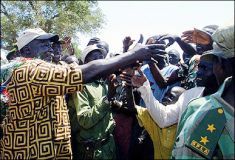Sudan rebels set to unanimously ratify peace agreement
RUMBEK, Sudan, Jan 23 (AFP) — The rebel Sudan People’s Liberation Movement Sunday debated a landmark deal with the government to end two decades of civil war, with members saying they expected it to be approved unanimously.

|
|
SPLA leader John Garang greets his supporters at freedom square in Rumbek during a rally on Wednesday June 8, 2004 (AFP). |
The movement’s National Liberation Council, or parliament, began discussing details of the text shortly after getting official copies of the Comprehensive Peace Agreement (CPA).
Lazarus Sumbweiyo, the retired Kenyan general who played an important role in negotiations between the two sides, delivered the documents in a brief ceremony in Rumbek, seat of the interim southern government.
More than half of the 220 members of the NLC, including rebel leader John Garang, were present, and members expressed optimism the agreement would be passed with little debate.
“We already have a quorum,” Garang told reporters ahead of the session, which was attended by delegates from the Nuba Mountains and southern Blue Nile as well as the south.
The council’s deputy speaker Gabriel Mathiang said he expected the agreement to be approved Monday or Tuesday.
“We shall pass it unanimously and without changes because this is an international agreement. We shall pass it as it is,” he said.
Earlier, Garang met separately with Sumbweiyo and UN envoy Jan Pronk for discussions that focused on the agreement’s implementation.
Pronk briefed the rebel leader on the mandate of the UN peace support mission due to be deployed in the country to ensure that both sides abide by the terms of the agreement, including a permanent ceasefire.
“I briefed the SPLM on the comprehensive mandate we have in mind,” Pronk told reporters.
The UN Security Council has promised to consider sending aid and military observers to south Sudan as part of a peace support mission.
But this will happen only after the mandate of the new mission has been approved, a process Pronk predicted could be completed by mid-February.
Pronk also encouraged the SPLM to sign the “Status of Mission Agreement”, a document declaring consent to the deployment of the military observers and a force to protect them.
“We discussed a kind of agreement between the UN and the SPLM to start the operation as soon as they can sign,” said Pronk.
The United Nations has appealed to a number of countries to contribute personnel for the mission, but only a handful, including China, Malaysia and Pakistan, have responded, and the SPLM has reservations about them.
“We have a balance between Islamic and non-Islamic countries, and the SPLM wants some time to think,” the UN envoy said. “We are using every positive answer,” he added.
Garang said: We have agreed that more consultations need to be done.”
He added that the SPLM would also consult with “our peace partners”, the ruling National Congress party, “and we will come back to the UN.”
Rebel leaders argue that countries such as China and Malaysia are too close to Khartoum due to the investments they have in the country’s lucrative oil sector and they have voiced concern about a conflict of interest.
“You need a neutral force,” said. “We really need more consultations.”
On January 9, the SPLM signed a final peace deal with the Khartoum government in Kenya, ending Africa’s longest conflict that had claimed some 1.5 million people and displaced four million others over the past 21 years.
